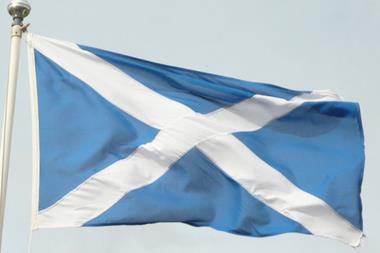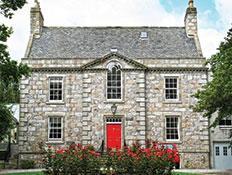In the end, even Andy Murray’s late rally didn’t deliver independence for Scotland.
It was all a bit nerve-wracking for Better Together, especially when Murray tweeted his 2.7 million followers on the dawn of last week’s vote. For residential and commercial agents throughout the country it was – as his mentor Sir Alex Ferguson would say – “squeaky bum time”. In the weeks before the vote numbers of transactions had been drifting lower. But the shock YouGov poll indicating a Yes victory not only had Westminster leaders doing a Dad’s Army “Don’t panic Mr Mainwaring” sketch – a director of a large residential and commercial agent told me that, in the aftermath of the poll, transactional business had “shut down”.
Another concurred.
Make no mistake, a “yes” would have been catastrophic for the property market. At risk of incurring the wrath of Yes trolls (my Twitter feed has already received some choice invective), here’s a bit of “scaremongering” (as dictated to me, obviously, by Number 10). There would have been a flight of capital: a lot of financial institutions would, in spite of Mr Salmond’s reassurances, have moved a lot more than their brass name plaques down south.
If there were any buyers for departing staff’s homes, they would have had trouble accessing mortgages while Holyrood, the Treasury and Bank of England tried to batter out deals, currency and the allocation of assets and liabilities. Central to this tug of war would have been RBS and Lloyds/Bank of Scotland – two of the biggest mortgage providers. It would have been difficult for them to lend while they didn’t know how their assets were going to be divvied up.
Some old hands suggested to me it might be a good punt to buy up properties in Berwick-upon-Tweed and Carlisle to sell a couple of years hence to loathed bankers who could commute to Edinburgh and Glasgow but avoid wealth taxes.
This will now not happen. Or will it? The outcome of the Corporal Jones panic was to entice defectors with a range of Devo Max measures, such as tax gathering powers.
A pound to a penny this will include new property taxes.
There was already going to be a sweeping new levy on the way, in the shape of a new variant on stamp duty, to be introduced next April, irrespective of the outcome of the vote. The Land and Building Transaction Tax (LBTT) has already received Royal Assent and its main mechanics have been worked out. However, the actual level of the levy was not going be announced until after the referendum. Politicians, eh?
Savills did a commendable research note on the LBTT last year (available on its website), based on scenarios published on behalf of the Scottish Parliament. A potential framework is zero tax up to a threshold of £180,000 (which covers the majority of properties in Scotland), thereafter a whopping sounding 7.5%, increasing to 10% over £1.5m.
A fundamental difference compared with current stamp duty is that that these would be applied to the incremental amount over each band rather than the “slab system”, in which the marginal percentage charge is levied on the entire value of the property. This would mean homes between £125,000 and £180,000 would be charged less, as would small bunches of above this amount. But Savills considers that the cost would increase by up to a half on most others. As with all property taxes, they normally just come off the selling price.
Worryingly, at a lunchtime seminar in Edinburgh this year where the scheme was discussed, none of the fund managers around the table had heard of it.
Nothing else is in the offing yet, but don’t rule out more taxes. Growing up in 1970s Lanarkshire, my family were the inhabitants of one of my hometown’s few “bought hooses”, a topic of some abuse (never mind that we didn’t have a colour telly, holidays to Benidorm or indulge in the Pools). While the Thatcherite revolution did scratch the surface in Scotland, I still sense vestiges of that resentment. Reading the diatribes from the Yes camp on Twitter, it would clearly be popular to, for instance, slap new taxes on second homes, or a “McMansion Tax”.
Will there be a knock-on effect on the Sassenachs? There could have been, in the event of a Yes vote: a run on the pound with attendant pressures on rates and the potential hiatus on Lloyds and RBS. New democratic powers for England might throw up unforeseen consequences. But what might have a greater effect is what is likely to be writhing discontent in Tory and Labour ranks at next year’s General Election. Throw into that mix the impact of UKIP and the EU referendum. Uncertainty is never a good backdrop for housing markets.
London prices could be further inflated by a migration of disaffected Edinburgh bankers. One further impact could well be that an acre or so of prime but undeveloped SW19 land could revert back to its old title, Henman Hill.
Alastair Stewart is building and property analyst at Progressive Equity Research






























No comments yet